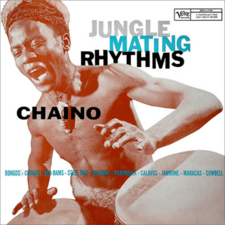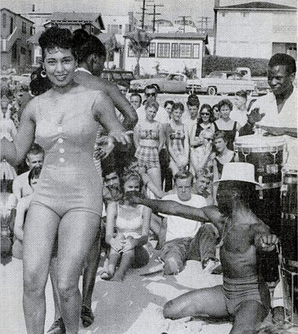Chaino facts for kids
Quick facts for kids
Chaino (Musician)
|
|
|---|---|

Chaino, Jungle Mating Rhythms (1958)
|
|
| Background information | |
| Birth name | Leon Johnson |
| Born | 1927 Philadelphia, Pennsylvania |
| Died | July 8, 1999 Chicago, Illinois |
| Genres | Exotica |
| Occupation(s) | Musician, Painter, jeweler and sculpture |
| Instruments | Bongos |
Leon "Chaino" Johnson (born 1927, died 1999) was a talented American musician. He called himself the "percussion genius of Africa." He was famous for playing the bongo drums.
Chaino toured for years, then released many albums. He became very popular in the late 1950s and early 1960s. His music was part of a style called exotica. To promote his music, a made-up story was told about him. This story said Chaino was an orphan from a lost African tribe. It claimed a missionary saved him after his tribe was attacked. But Chaino was actually born in Philadelphia, USA. He grew up in Chicago.
| Top - 0-9 A B C D E F G H I J K L M N O P Q R S T U V W X Y Z |
Chaino's Early Life
Chaino was born in Philadelphia. He grew up in Chicago's South Side. After elementary school, Chaino left home. He wanted to travel across the country. He started playing the bongos. He toured many clubs, especially those on the "Chitlin' Circuit." This was a group of venues where many Black artists performed.
Chaino's brother, George Johnson, said Chaino lost touch with his family. He became well-known as a percussionist in the 1940s and 1950s.
Making Exotica Music
In 1958, Chaino started working with record producer Kirby Allan. Together, they released several albums in the late 1950s. Their first album was Jungle Mating Rhythms. Verve Records released it in 1958.
Chaino and Allan released six more albums. These included Percussion for Primitive Lovers and Jungle Echoes. The albums featured Chaino playing bongos, steel drums, and other percussion. He also added primal chants, grunts, and howls. Allan called this "sensual primitive music." He also described it as "Americanized African" music.
What Critics Said
In June 1958, Billboard magazine reviewed Chaino's music. They gave his song "Eyes of the Spectre" a four-star review. They said his album had a "truly unusual sound." The review noted that Chaino played many instruments by himself. These included bongos, congo drums, and gourds. They described his rhythms as African or Afro-Cuban. Chaino also whistled, wailed, and whooped in the background.
The Fictional Story
To make his music more popular, a special story was created for Chaino. This story said he was an orphan. It claimed he was the only survivor of a "lost race" from a remote jungle in Africa. The story said he could play many drums at once, very quickly. It also said a missionary brought him to the United States. This fictional story used common stereotypes.
Chaino also worked as a session musician. This means he played on other artists' recordings. He appeared in two movies: Night Tide (1961) and The Devil's Hand (1962). He was also in a TV movie called The Phantom (1961). In 1962, he toured with famous singer Miriam Makeba.
Music's New Popularity
Chaino's music became popular again in the late 1990s. This was when people rediscovered exotica and "ultra lounge" music. In his book Mondo Exotica, Francesco Adinolfi wrote about Chaino's albums. He said they showed exotica at its best. He mentioned the strong rhythms and wild cries. Matt Maranian, in Pad: The Guide to Ultra-Living, called Chaino's music "a cut above your average exotica."
Chaino's Later Life
Chaino later lived in Oklahoma City. He played music in local clubs there. In 1989, a kind person named Carl Brandon found Chaino. Carl helped Chaino by renting him a house. He also encouraged Chaino to get government help. Chaino quickly became part of the local music scene. He was loved and admired there.
Chaino returned to Chicago to see his brother. In 1998, he was hurt and went back to Chicago. He stayed with his brother. Chaino passed away in Chicago in July 1999. A CD called Chaino, Africana and Beyond was released after his death.
Chaino's Albums
- Night of the Spectre (1958), Tampa Records TP-4
- Jungle Mating Rhythms (1958), Verve MGV-2104
- Jungle Rhythms (1958), Score SLP 4027
- Jungle Echoes (1958), Omega Records OSL 1007
- Africana (1959), Dot DLP-3420
- Temptation (1961), Omega Records
- The Kirby Allan Group, Percussion for Primitive Lovers, Maze MAZ-B-331
- The Kirby Allan Group, Percussion For Playboys Volume One, Maze MAZ-B-385
- The Kirby Allan Group, Percussion For Playboys Volume Two, Maze MAZ-B-387
 | Shirley Ann Jackson |
 | Garett Morgan |
 | J. Ernest Wilkins Jr. |
 | Elijah McCoy |


